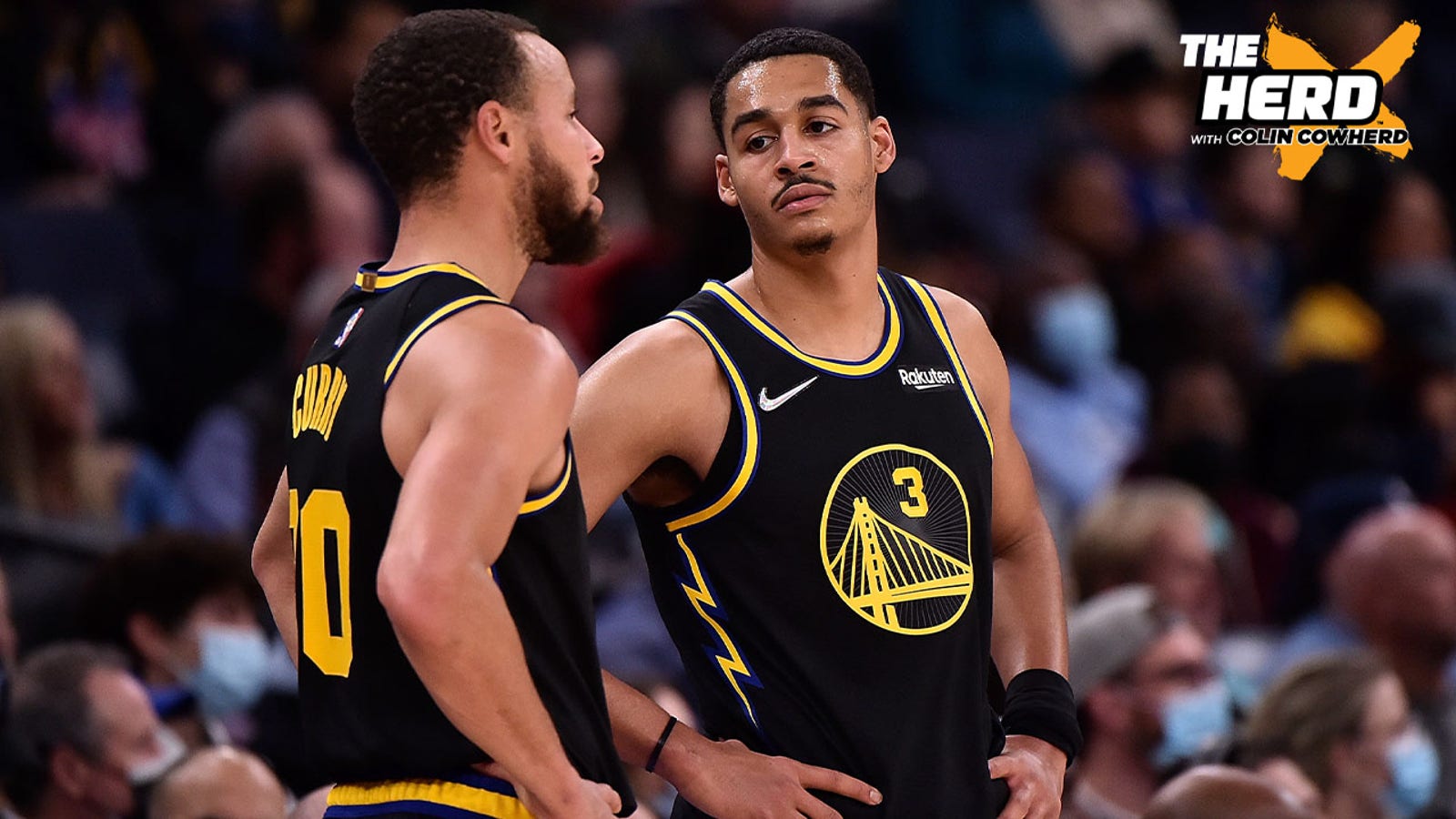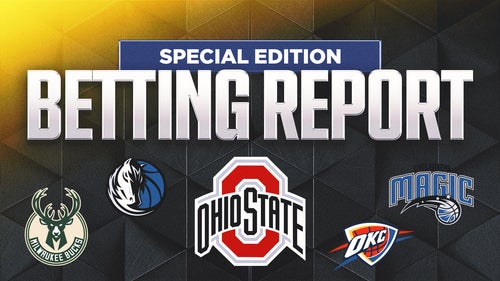
How Warriors' Jordan Poole became key complement to Splash Brothers
By Ric Bucher
FOX Sports NBA Writer
This time, Jordan Poole didn’t need to shoot with the lights off to shoot the lights out.
Poole came off the bench Sunday to score a playoff-career-high 31 points and pick up the slack for subpar performances from Steph Curry and Klay Thompson to help the Warriors eke out a 117-116 road win over the Memphis Grizzlies in Game 1 of their best-of-seven second-round series.
It was reminiscent of his performance in Game 1 of their first-round series against the Denver Nuggets, in which Poole had 30 on an über-efficient 9-for-13 shooting, including five of seven 3-pointers. The night before his postseason baptism, the 6-foot-4 guard went to the Chase Center to get in one more shooting session, only to find the lights off as game operations prepared theatrics for the building’s first playoff game.
Undaunted, Poole got up shots anyway.
"I’ve done it before in high school and college," Poole said in an exclusive interview with FOX Sports before the Warriors left for Memphis on Saturday. "It’s not, like, a consistent thing. It was just a situational thing. But it was cool. I might ask E to do it again, to be honest."
That’s "E" as in Eric Housen, the team’s director of operations. Housen, having started with the franchise as a ball boy in 1985, is also a walking encyclopedia when it comes to its history. He informed Poole that he was following in the footsteps of a Golden State legend with his session in the dark and subsequent torrid playoff performance.
Hall of Fame forward Chris Mullin did the exact same thing back in 1991. After missing Game 1 of the Warriors’ second-round series with the Los Angeles Lakers because of a knee injury suffered in the previous series against San Antonio, Mullin went to the Great Western Forum the night before Game 2 to get up some shots, only to find the lights off. By the glow of the Exit signs, Mullin went through his usual full-court shooting routine anyway, and the next day, he went a scorching 16-for-21 to tie his playoff career high of 41 points and lead the Warriors to their only win of the series 125-124.
Mullin, sitting courtside while Poole warmed up a few feet away before Game 2 against the Nuggets, said, "I heard you shot in the dark the other night. It works, doesn’t it?"
Poole grinned knowingly and shook his head.
Before any aspiring marksmen — or their coaches — incorporate shadowy shooting sessions, know that neither Poole nor Mullin believes his session gave him some sort of extra-sensory powers under the bright lights that led to the extraordinary performance.
"It’s coincidence," Mullin said. "We assumed the Lakers were playing games because we told them we were coming. The number one thing I think it shows, though, is discipline and dedication. Most guys would say, ‘Oh, the lights are off. I can’t shoot. Let’s get out of here.’ That’s not Jordan."
It shows. The 28th overall pick of the 2019 draft out of Michigan, Poole has improved his accuracy in every phase of the game every single season and led the league in free-throwing shooting this year at 92.5%, nearly a 13% jump from his rookie mark. That proved to be vital for the Warriors this season, with Thompson sidelined until January as he recovered from a torn ACL and Achilles tendon and Curry laboring through the worst shooting season of his 13-year career.
Both Thompson and Curry were less than their optimal best to start the series against the Nuggets, but it didn’t matter because Poole took up the slack. He scored 30, 29 and 27 points in Games 1, 2 and 3 and shot better than 62% in all three.
"He’s one of the top players in the league," Mullin said. "You know how they redo a draft somewhere down the road? If they redid the All-Star voting now, he’d be an All-Star for sure."
What makes Jordan Poole and Warriors stand out
The Nuggets paid Poole the ultimate compliment by shifting their attention to him in Games 4 and 5. That showed, too, as Poole suddenly looked mortal, scoring 11 and eight points. But that extra attention provided better looks for Thompson and Curry, who went for 33 and 32 in Game 4 and 15 and 30 in Game 5.
"I wasn’t getting as much space, or people weren’t helping off me a little bit more," Poole said. "So obviously, the game plan switched up a bit, which was really cool to see, this being my first time being in [the postseason].
"What makes us special is if you’re going to go to those lengths to take me out of the game, we have so many other players who are able to step up. We’re a championship-caliber team, and this time of the year, it’s about winning. That’s all that matters. Sacrifices."
The Grizzlies did not take the same approach in Game 1 on Sunday. That Poole made them pay was not an accident or a surprise to Curry.
"You have to game plan for him, or he’ll torch you," Curry said of Poole before the Memphis series. "Matchups, blitzes, traps — I’ve been through that for years and all the learning lessons and experiences of going through that. Jordan asked some amazing questions going from Game 3 to Game 4 and 4 to 5 around what that was like.
"No player has had a smooth ride and arrival to the playoffs, where every game he can just ball out of control like that. I knew [the added attention] was coming eventually, but I’m betting on him to figure it out.
"For me and other guys who have been around to watch it, it’s kind of dope. Just knowing we’re still at this level trying to do it, and there’s another guy seeing it through an entirely different lens. Keeps it fresh."
Mullin has enjoyed watching Poole’s evolution as well.
"He had irrational confidence when he first got here," Mullin said. "He’s doing the same things he was trying to do then. He just couldn’t go by guys like he can now. He’d over-dribble hunting his shot. Now if he can’t get by his guy after two or three dribbles, which is rare when he can’t, he gets off the ball and becomes Klay Thompson, a catch-and-shoot threat.
"What I really admire is that comes from doing the work when no one’s watching. Working on your body, eating the right things. He’s getting crazy separation now. Ask any efficient shooter: It’s the quality of the shot that makes the difference."
A clip of Boston Celtics legend Larry Bird saying it took just a few days into his first training camp to realize he could dominate the NBA is making the rounds on social media these days. It took Poole a little longer, but he had the same epiphany as a rookie.
"My first year after I was able to see exactly what the league was about, how they guard, I was fine after that," he said. "It’s a different style of basketball [than in college]. It’s faster, more athletic. It’s just two different games of basketball. It just takes a matter of seeing it, and then you know what you need to work on or how you can get your shot.
"All the shots I’m shooting now, I was shooting in high school and college. The difference is it’s not a 6-[foot]-2 center coming over to trap the ball, it’s a 7-foot, athletic big. You’ve got to find a way around those niches."
Head coach Steve Kerr's giving him the same green light afforded Curry and Thompson, Poole said, inspired him not to abuse it. Case in point: In Game 4 against the Nuggets, while scoring only eight points, Poole had nine assists.
"Knowing that I can essentially shoot any shot I feel comfortable taking makes it a lot easier to pass up shots to get everybody else involved," he said. "What makes us really click is that we’re all aggressive players who are willing to make the right play. We can all look for our shots. We know what shots we can get to, what shots we’re comfortable taking. We know how to get ourselves in situations to get good looks, but we’re also team players."
That extends to the brotherhood of shooters in the dark. At one point as he warmed up to face the Nuggets, Poole startled Mullin by bouncing the ball to him as he sat in his courtside seat.
Poole, with a sly grin, said, "I know who to pass the ball to."
Ric Bucher is an NBA writer for FOX Sports. He previously wrote for Bleacher Report, ESPN The Magazine and The Washington Post and has written two books, "Rebound," the story of NBA forward Brian Grant’s battle with young onset Parkinson’s, and "Yao: A Life In Two Worlds," the story of NBA center Yao Ming. He also has a daily podcast, "On The Ball with Ric Bucher." Follow him on Twitter @RicBucher.











